Related Research Articles

Kanagawa 11th district is a constituency of the House of Representatives in the Diet of Japan. It is located in Kanagawa Prefecture, and consists of the cities of Miura and Yokosuka.
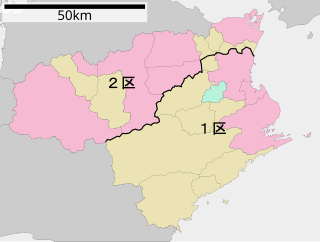
Tokushima 1st district (徳島県第1区) is a constituency of the House of Representatives in the Diet of Japan, located in Tokushima Prefecture on the island of Shikoku.
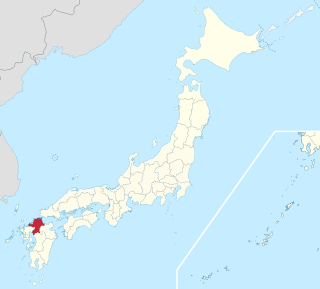
Fukuoka at-large district is a constituency of the House of Councillors in the Diet of Japan. It consists of the entire prefecture of Fukuoka and is represented by four Councillors electing two per election by single non-transferable vote.

Saga 1st district is a single-member constituency of the House of Representatives in the national Diet of Japan located in Saga Prefecture.
The Yamaguchi at-large district is a constituency of the House of Councillors in the Diet of Japan. It consists of the entire prefecture of Yamaguchi and is represented by two Councillors electing one every three years.
Tokyo's 1st district was a constituency of the House of Representatives in the Diet of Japan. Between 1947 and 1993 it elected four, later three representatives by single non-transferable vote. It initially consisted of Tokyo's Chiyoda, Chūō, Minato, Shinjuku, Bunkyō and Taitō special wards. In the 1964 redistricting Chūō, Bunkyō and Taitō were split off to form the new 8th district.

Kagawa at-large district is a constituency of the House of Councillors in the Diet of Japan. It consists of Kagawa Prefecture and elects two Councillors, one every three years by a first-past-the-post system for a six-year term. In the first election in 1947, Kagawa like all districts used single non-transferable vote to elect both its Councillors in one election.
Tokyo 2nd district was a constituency of the House of Representatives in the Diet of Japan. Between 1947 and 1993 it elected three, later five representatives by single non-transferable vote. It initially consisted of Shinagawa and Ōta in Eastern mainland Tokyo and, following their return from US military administration, Tokyo's Izu and Ogasawara islands. Since the election of 1996, the area forms the new single-member 3rd district.
Tokyo 7th district was a constituency of the House of Representatives in the Diet of Japan. Between 1947 and 1993 it elected five, later four representatives by single non-transferable vote. It initially consisted of mainland Western Tokyo as a whole, namely the cities of Hachiōji and Tachikawa and the Nishitama, Minamitama and Kitatama districts of Tokyo.
Tokyo 8th district was a constituency of the House of Representatives in the Diet of Japan. Between 1967 and 1993 it elected three, later two representatives by single non-transferable vote. It was created in a 1964 redistricting form areas that had previously formed part of the 1st district: It consisted of Eastern Tokyo's Chūō, Bunkyō and Taitō special wards, central parts of the former city of Tokyo. In a reapportionment for the 1993 election the number of representatives for Tokyo 8th district was reduced from three to two. Following the 1994 electoral reform, the area now forms the single-member Tokyo 2nd district.
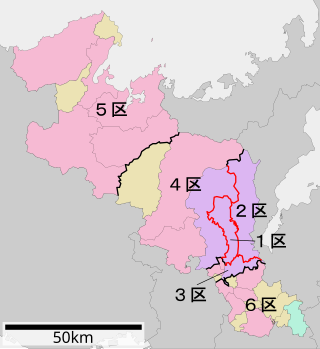
Kyōto 2nd district is a constituency of the House of Representatives in the Diet of Japan. It is located in central Kyoto and consists of the Kyoto city wards of Sakyō, Higashiyama and Yamashina. As of 2012, 267,926 eligible voters were registered in the district.

Nagasaki 1st district is a constituency of the House of Representatives in the Diet of Japan. It is located in Nagasaki prefecture and covers the city of Nagasaki.

The Nagasaki at-large district is a constituency of the House of Councillors in the Diet of Japan. It consists of Nagasaki Prefecture and elects two Councillors, one every three years by a first-past-the-post system for a six-year term. In the first election in 1947, Nagasaki like all districts used single non-transferable vote to elect both its Councillors in one election. Similar to other small, rural Kyushu prefectures, it is a "conservative kingdom" in favor of the LDP. Since the Democratic Party folded, LDP candidates have consistently won with over 50% of the vote.

Nagasaki 2nd district is a constituency of the House of Representatives in the Diet of Japan located in Nagasaki prefecture. The district covers a southern part of the prefecture as well as a few outlying islands.
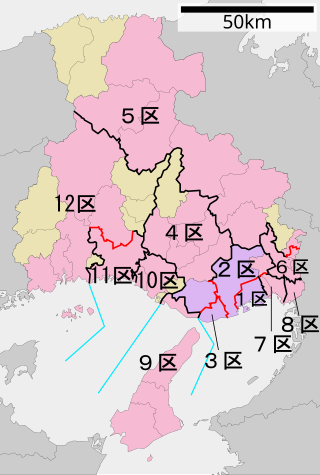
Hyogo 11th district is a constituency of the House of Representatives in the Diet of Japan. It is located in Southwestern Hyōgo and is based on the 1995 borders of the city of Himeji; the former towns of Ieshima, Yumesaki, Kōdera and Yasutomi that merged into Himeji in 2006 are part of the 12th district. As of September 2015, 387,509 eligible voters were registered in the district.
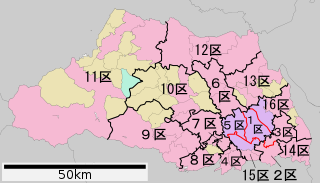
Saitama 3rd district is a constituency of the House of Representatives in the Diet of Japan. It is located in Southeastern Saitama and consists of the cities of Kawaguchi and Koshigaya. As of 2012, 460,884 eligible voters were registered in the district.

Ibaraki 4th district is a single-member constituency of the House of Representatives in the Diet of Japan. It is located in Northern Ibaraki and consists of the cities of Hitachinaka, Hitachiōta, Hitachiōmiya and Naka and the town of Daigo. As of 2021, 268,147 eligible voters were registered in the district.
Kyōto 2nd district was a multi-member constituency of the House of Representatives in the Diet of Japan. Between 1947 and 1993 it elected five Representatives by single non-transferable vote. It was located in Kyōto and, as of 1993, consisted of Kyōto city's Ukyō, Fushimi and Nishikyō wards and all other cities, towns and villages in the prefecture.
Kyōto 1st district was a constituency of the House of Representatives in the Diet of Japan. Between 1947 and 1993 it elected five Representatives by single non-transferable vote. It was located in Kyōto and consisted, as of 1993, of the cities of Kyōto city's wards of Sakyō, Higashiyama, Kamigyō, Kita, Nakagyō, Shimogyō, Minami and Yamashina. Today, the area is split between Kyōto 1st and 2nd single-member electoral districts.

Nagasaki 3rd district is a single-member electoral district of the Japanese House of Representatives, the lower house of the National Diet. It is located in the prefecture of Nagasaki and covers northern parts of the prefecture on the main island of Kyūshū and the Gotō Islands. Most of the population lives in or around the city of Sasebo.
References
- ↑ "衆議院>第23回衆議院議員選挙>長崎県>長崎1区". www.senkyo.janjan.jp ザ・選挙 (in Japanese). JANJAN . Retrieved 2011-02-11.[ permanent dead link ]
- ↑ "衆議院>第23回衆議院議員補欠選挙". www.senkyo.janjan.jp ザ・選挙 (in Japanese). JANJAN. Archived from the original on 2010-08-17. Retrieved 2011-02-11.
- ↑ "衆議院>第24回衆議院議員選挙>長崎県>長崎1区". www.senkyo.janjan.jp ザ・選挙 (in Japanese). JANJAN. Archived from the original on 2011-08-16. Retrieved 2011-02-11.
- ↑ "衆議院>第25回衆議院議員選挙>長崎県>長崎1区". www.senkyo.janjan.jp ザ・選挙 (in Japanese). JANJAN. Archived from the original on 2007-07-29. Retrieved 2011-02-11.
- ↑ "衆議院>第26回衆議院議員選挙>長崎県>長崎1区". www.senkyo.janjan.jp ザ・選挙 (in Japanese). JANJAN. Archived from the original on 2011-08-16. Retrieved 2011-02-11.
- ↑ , 中嶋太郎
- ↑ "衆議院>第27回衆議院議員選挙>長崎県>長崎1区". www.senkyo.janjan.jp ザ・選挙 (in Japanese). JANJAN. Archived from the original on 2007-07-29. Retrieved 2011-02-11.
- ↑ "衆議院>第28回衆議院議員選挙>長崎県>長崎1区". www.senkyo.janjan.jp ザ・選挙 (in Japanese). JANJAN. Archived from the original on 2007-03-09. Retrieved 2011-02-11.
- ↑ "衆議院>第29回衆議院議員選挙>長崎県>長崎1区". www.senkyo.janjan.jp ザ・選挙 (in Japanese). JANJAN. Archived from the original on 2007-03-09. Retrieved 2011-02-11.
- ↑ "衆議院>第30回衆議院議員選挙>長崎県>長崎1区". www.senkyo.janjan.jp ザ・選挙 (in Japanese). JANJAN. Archived from the original on 2011-08-16. Retrieved 2011-02-11.
- ↑ joined LDP (Miki faction)
- ↑ "衆議院>第31回衆議院議員選挙>長崎県>長崎1区". www.senkyo.janjan.jp ザ・選挙 (in Japanese). JANJAN. Archived from the original on 2007-07-29. Retrieved 2011-02-11.
- ↑ "衆議院>第32回衆議院議員選挙>長崎県>長崎1区". www.senkyo.janjan.jp ザ・選挙 (in Japanese). JANJAN. Archived from the original on 2011-08-16. Retrieved 2011-02-11.
- ↑ "衆議院>第33回衆議院議員選挙>長崎県>長崎1区". www.senkyo.janjan.jp ザ・選挙 (in Japanese). JANJAN. Archived from the original on 2011-08-16. Retrieved 2011-02-11.
- ↑ "衆議院>第34回衆議院議員選挙>長崎県>長崎1区". www.senkyo.janjan.jp ザ・選挙 (in Japanese). JANJAN. Archived from the original on 2011-08-16. Retrieved 2011-02-11.
- ↑ "衆議院>第35回衆議院議員選挙>長崎県>長崎1区". www.senkyo.janjan.jp ザ・選挙 (in Japanese). JANJAN. Archived from the original on 2011-08-16. Retrieved 2011-02-11.
- ↑ "衆議院>第36回衆議院議員選挙>長崎県>長崎1区". www.senkyo.janjan.jp ザ・選挙 (in Japanese). JANJAN. Archived from the original on 2011-08-16. Retrieved 2011-02-11.
- ↑ "衆議院>第37回衆議院議員選挙>長崎県>長崎1区". www.senkyo.janjan.jp ザ・選挙 (in Japanese). JANJAN. Archived from the original on 2008-03-16. Retrieved 2011-02-11.
- ↑ "衆議院>第38回衆議院議員選挙>長崎県>長崎1区". www.senkyo.janjan.jp ザ・選挙 (in Japanese). JANJAN. Archived from the original on 2008-03-16. Retrieved 2011-02-11.
- ↑ "衆議院>第39回衆議院議員選挙>長崎県>長崎1区". www.senkyo.janjan.jp ザ・選挙 (in Japanese). JANJAN. Archived from the original on 2011-08-16. Retrieved 2011-02-11.
- ↑ "衆議院>第40回衆議院議員選挙>長崎県>長崎1区". www.senkyo.janjan.jp ザ・選挙 (in Japanese). JANJAN. Archived from the original on 2011-08-16. Retrieved 2011-02-11.